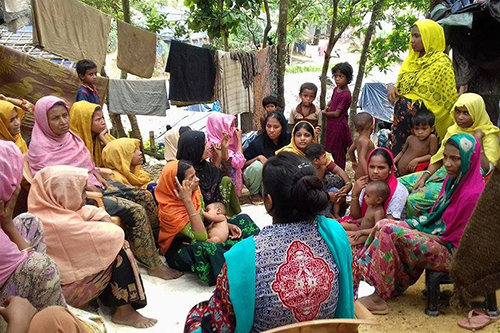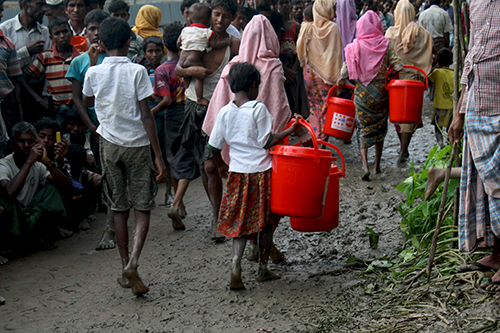News
As Rohingya refugees pour into Bangladesh, UNFPA deploys midwives, safe spaces
- 13 September 2017
News
DHAKA, Bangladesh – An “unprecedented” flow of Rohingya refugees is crossing the border into Bangladesh, with an estimated 370,000 pouring across the border since 25 August to escape the latest violence in Myanmar’s Rakhine State.
The Rohingya population in Cox’s Bazar District has more than doubled and is still increasing day by day, overwhelming existing camps and settlements as well as host communities and relief agencies.
UNFPA is urgently working to meet the needs – including sexual and reproductive health needs – of refugees. Among the arrivals so far, an estimated 67 per cent are women and girls. Among them, 13 per cent are pregnant or breastfeeding. And these numbers may rise.

“Women do not stop getting pregnant or having babies just because an emergency hits,” said Iori Kato, UNFPA’s Acting Representative in Bangladesh.
The arrivals also require safety from violence. The risk of gender-based violence is known to increase in humanitarian emergencies, as populations are displaced and protection systems are disrupted.
UNFPA has deployed dozens of midwives, many with special training in humanitarian response, to Cox’s Bazar. These midwives are supporting the health personnel already working around the clock to meet the needs of pregnant women, new mothers and newborns. They are also responding to the medical needs of survivors of sexual violence.
“The women who are coming for check-ups all have a terrified and exhausted look,” said Sumaya, a UNFPA-supported midwife posted in the Nayapara refugee camp. “We keep hearing stories from them of walking through jungles and across hills for days without food, their children carried over their shoulders. They’ve lost their homes.”
UNFPA is also distributing clean delivery kits, which contain the supplies necessary for health personnel to safely manage childbirth and provide post-natal care.

Thousands of women and girls are also receiving UNFPA-provided dignity kits, which contain hygiene supplies such as soap and sanitary napkins, as well as flashlights to help women and girls safely navigate at night.
And UNFPA’s women-friendly spaces are providing a safe place for women and girls to rest and receive referrals to support services, including health care, psychosocial support and counselling, and professional case management for survivors of gender-based violence.
“Because of this safe space, I rested and was able to breastfeed my children,” said one woman at a women-friendly space. Her journey to Bangladesh was harrowing. “I lost my husband and one child,” she explained. “Here I’ve received mental health support, and have a place to talk about my suffering on this journey.”
Still, the humanitarian needs are staggering.
“The magnitude of these needs is immense, and growing,” said Mr. Kato.
UNFPA is seeking $13 million to provide life-saving reproductive health care and services to prevent gender-based violence and respond to its aftermath. This funding will support UNFPA’s humanitarian activities in Cox's Bazar through August 2018.
– Rachel Tze